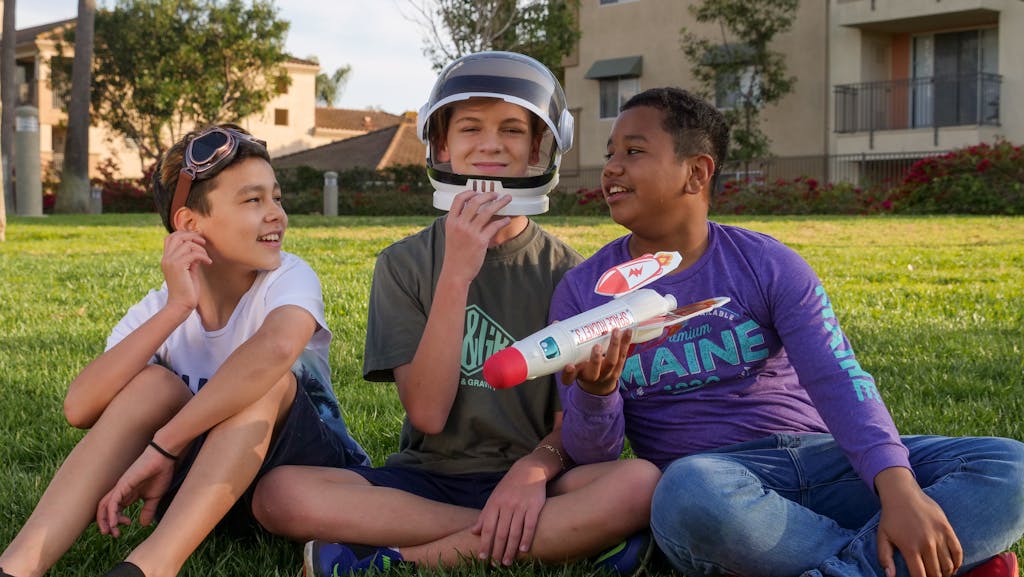What do behavior strategies in the homeschool classroom look like? In this artlcle we look at whether or not behavior stategies teachers use in the traditional classroom can work in the homeschool classroom.
Homeschooling offers a unique environment for both students and educators, providing flexibility, individualized attention, and the opportunity to create a learning space that works best for each child.

However, just like traditional classrooms, behavior management in a homeschool setting can be challenging. Without the structure and social dynamics of a typical school environment, it can be harder to keep students engaged and focused. The key to effective behavior management in a homeschool setting is finding strategies that work for both the student’s personality and the family’s routines.
Homeschooling your child means that at certain times in the day the relationship turns from parent and child to teacher and student.
Behavior Strategies: School vs. Homeschool
Behavior strategies used in the traditional classroom can work in the homeschool classroom, but they often need to be adapted to fit the unique dynamics of a home learning environment. In a homeschool setting, where the teacher is often the parent, strategies like setting clear expectations, establishing routines, and using positive reinforcement remain effective.

However, the approach may need to be more personalized, considering the smaller class size and the deeper parent-child relationship. For example, instead of group-based rewards, homeschool parents might use individual incentives tailored to their child’s interests. Additionally, techniques like visual schedules, consistent consequences, and goal-setting can be seamlessly integrated into the day-to-day homeschool routine, ensuring that the learning environment remains structured, supportive, and engaging.
Behavior Related Issues & Strategies
In the past, serve discipline measures, including certain forms of physical punishment existed, to manage student behavior.
In today’s society, physical punishment as part of behavior management is not looked upon as an ideal solution to a child misbehaving.
Homeschooling offers a unique and flexible educational experience, but it also comes with its own set of challenges—especially when it comes to managing behavior. While homeschooling allows for individualized attention and tailored learning, it can also present certain behavior-related issues that may require careful attention and creative solutions.

Here are some common behavior-related issues homeschooling parents may face in the homeschool classroom:
- Lack of Focus or Motivation: Without the peer-driven structure of a traditional classroom, some children may struggle to stay engaged or motivated to complete their work, especially when distractions like toys, screens, or siblings are nearby.
- Resistance to Parental Authority: The dual role of parent and teacher can sometimes lead to pushback, as children may test boundaries or resist viewing their parent in an educator role.
- Difficulty Transitioning Between Activities: Without the cues and schedules of a classroom environment, homeschoolers may find it challenging to shift smoothly from one subject or task to another, leading to frustration or delays.
A tool for modeling positive behavior is:
Here now are four important ways to building effective behavior strategies in the homeschool classroom.
1. Be Flexible and Adapt to the Student’s Needs
One of the biggest advantages of homeschooling is the ability to personalize the learning experience for each child. Unlike traditional classrooms, where students may be forced to fit into a one-size-fits-all approach, homeschooling allows for flexibility in both teaching methods and behavior strategies.
What this looks like: If you notice that a particular lesson or subject is causing frustration or disengagement, adjust it to better suit your child’s needs. For example, a child who struggles with math might benefit from more hands-on, visual learning methods, while a student who enjoys creative projects might appreciate completing a lesson through art or role-playing. If a student is consistently off-task or displaying negative behaviors, consider whether the material is too difficult or too easy, and adjust accordingly.

Why it works: Flexibility in teaching allows for a better match between the child’s learning style and the content being delivered, reducing frustration and negative behavior. It also fosters a sense of autonomy, as students are more likely to stay engaged when they feel their interests and strengths are recognized and nurtured.
2. Teach Self-Regulation and Emotional Control
Homeschooling provides an opportunity to emphasize social-emotional learning (SEL) and self-regulation skills. These skills are essential for students to develop not only in terms of managing behavior but also for their long-term success both academically and personally. When children are taught to recognize their emotions and use strategies to manage them, they are better equipped to handle frustration, anxiety, or excitement—emotions that can lead to behavioral issues.
What this looks like: Model calm and positive behaviors, especially when things get tense or when a lesson is challenging. Use simple language to help students identify their emotions: “I see you’re feeling frustrated, but let’s take a deep breath and try again.” Encourage the use of tools like breathing exercises, mindfulness techniques, or quiet time to help students regain focus and composure.
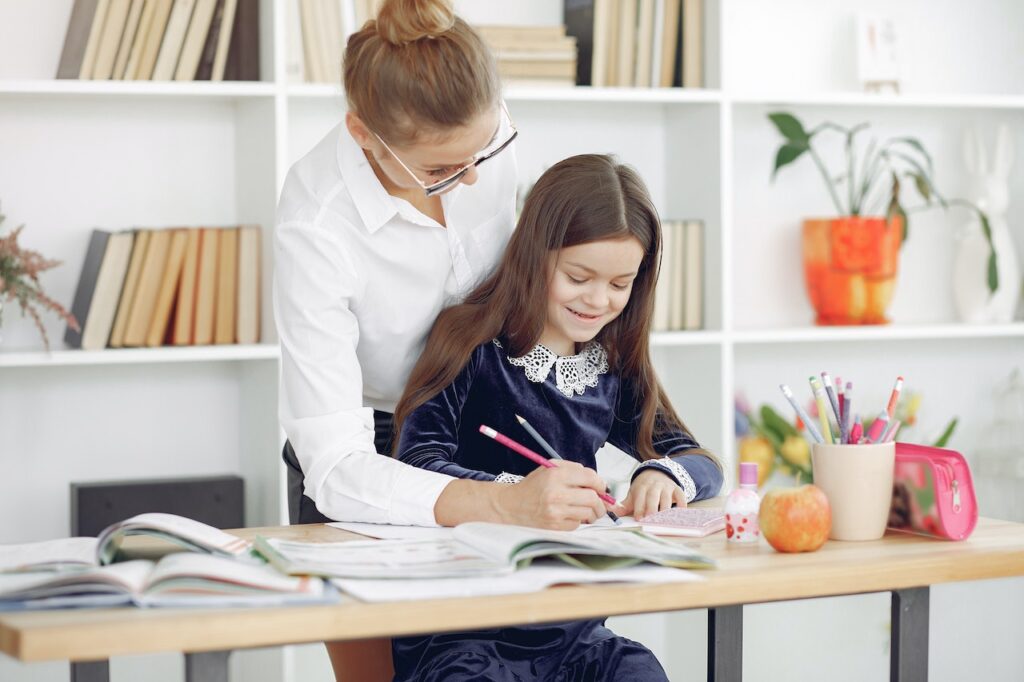
Why it works: By teaching children how to manage their emotions and responses, you reduce the likelihood of disruptive behavior. Over time, students will become more independent in regulating their behavior, which is an important life skill both in and outside the homeschool setting.
Journal Writing In Sensitive Times
This blog contains affiliate links to highlighted websites and/or resources. By clicking on the link and making a purchase we may earn a small commission at no extra cost to you. Click here for full disclosure.
Journal writing is a powerful tool for nurturing creativity, critical thinking, and self-expression in the homeschool classroom. Using Promptly Journals, homeschooling parents can provide students with structured yet flexible writing prompts that inspire reflection and exploration of ideas. These beautifully designed journals help students build essential writing habits while encouraging them to dive deeper into their thoughts and feelings.
Sometimes students may need an outlet to express their ideas, or drawings, or different ways to express emotions in better understanding their behavior. Parebts should encourage their children to use journals as a way of reflecting on their emotions.
Whether it’s documenting daily gratitude, writing about personal goals, or exploring imaginative narratives, Promptly Journals offer a practical and engaging way to integrate writing across subjects. Perfect for all grade levels, they help transform journaling into a meaningful, enjoyable learning experience.
3. Acknowledge the Imbalance of Parent-Child Roles
In a homeschooling environment, the parent often plays multiple roles: educator, caregiver, disciplinarian, and sometimes even a peer or friend. This can lead to confusion or boundary issues for the child, especially if the parent is trying to maintain authority while also fostering a warm, supportive relationship.

Clearly define the roles and expectations within the homeschooling day. When working on academic tasks, the parent should adopt the role of a teacher, while at other times (e.g., during family meals or relaxation), they can step into the role of a caregiver or friend. Establishing boundaries between work and family time can help both the child and parent switch between these roles more easily.
4. Use Resources for Classroom Management
We provide free resources to help parents deal with behavior issues in the homeschool classroom. The resource we offer below work best for students in grades 4 and older.
Download your free copy of our behavior reflection sheet and get a BONUS homework reflection sheet to use in the classroom.
4.1 Behavior Reflection Sheet
This sheet has the student firsts recognize the wrong behavior that got them the sheet in the first place.
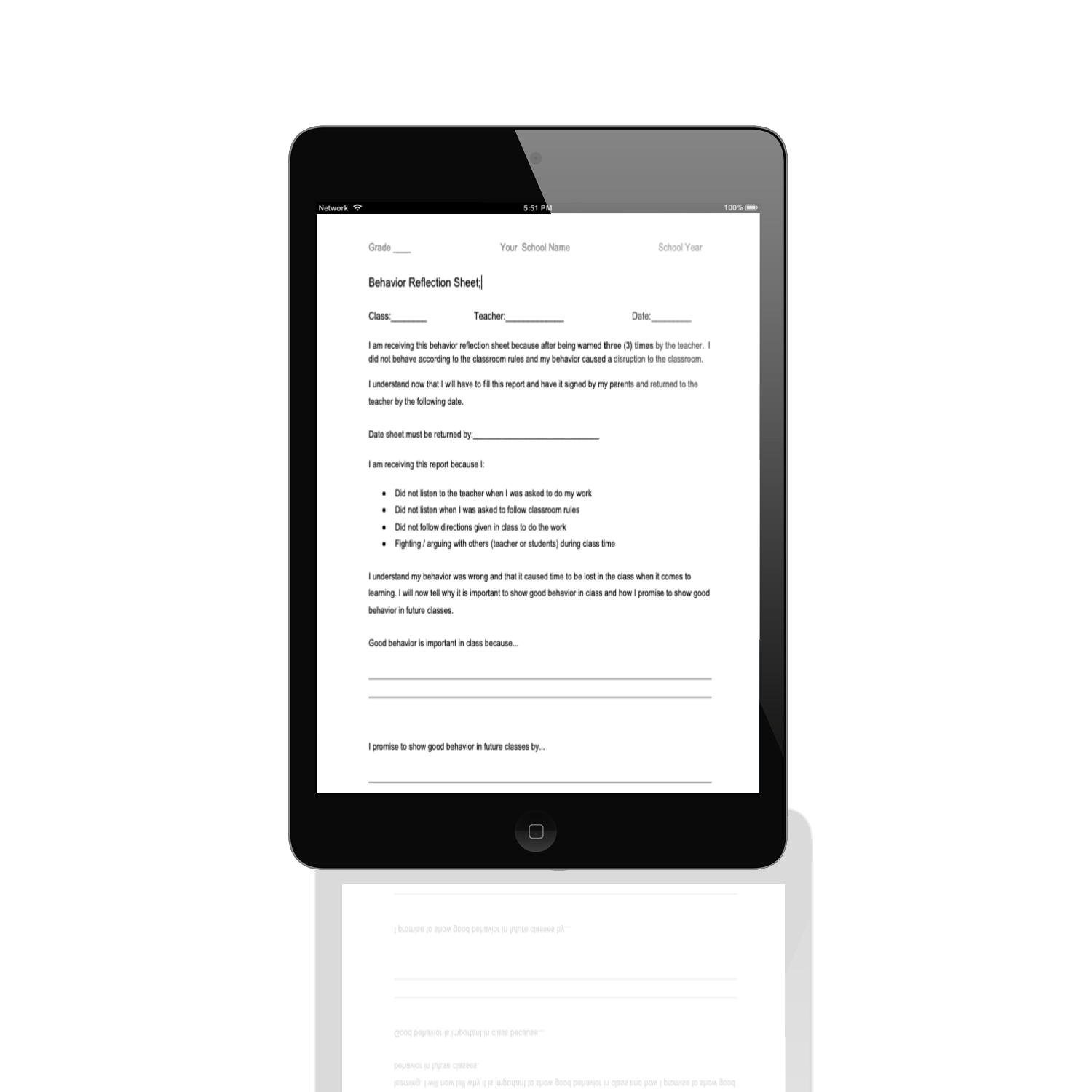
It then asks the student to reflect on why good behavior is important and how they will show good behavior moving forward.
Click here to download this sheet in our digital products shop!
4.2 Homework Reflection Sheet
This sheet has the student first explain their lack of responsibility that got them the sheet in the first place.
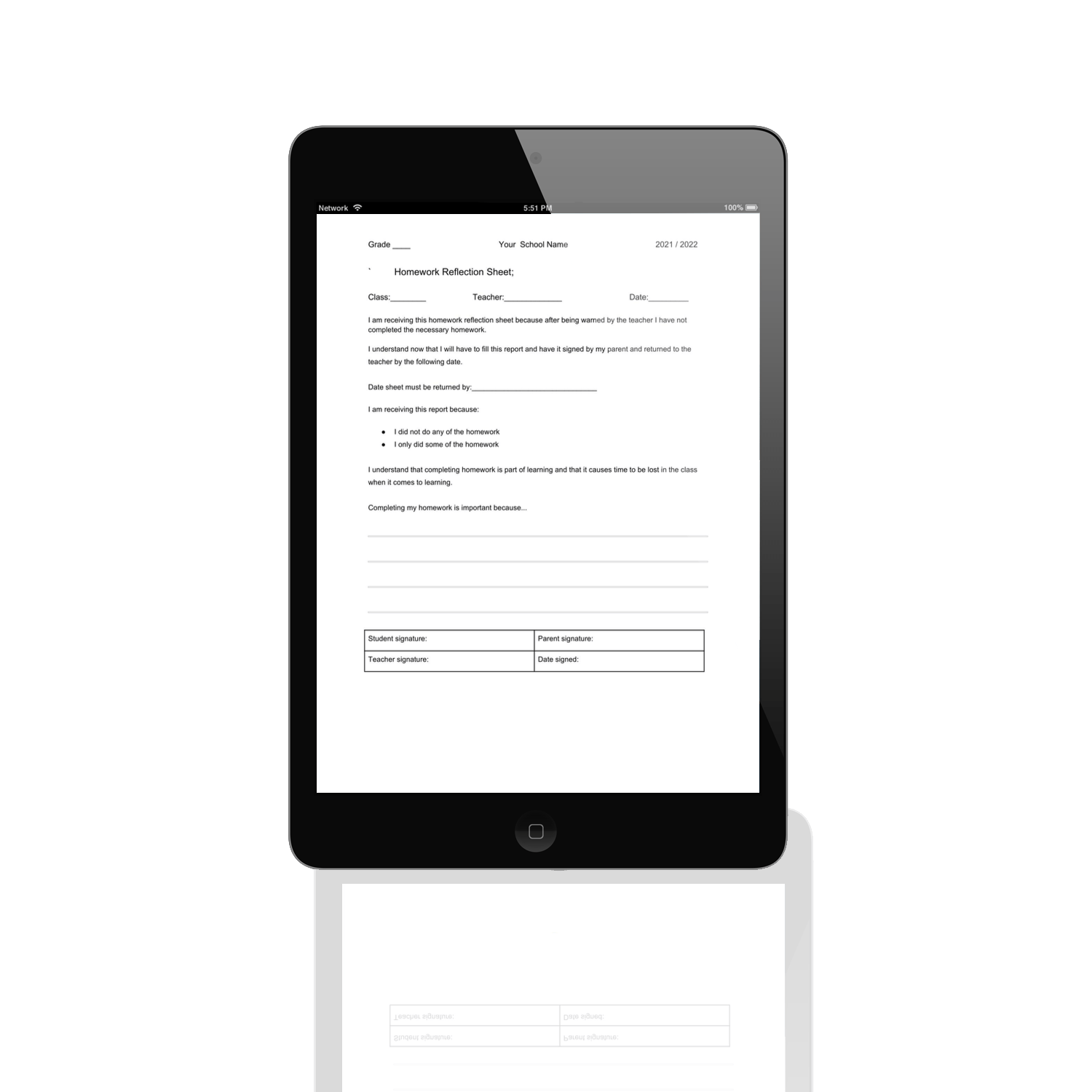
It then asks the student to reflect on why homework is important and how they will recognize their responsibility moving forward.
Click here to download this sheet in our digital products shop!
Join Our Newsletter Community Today!
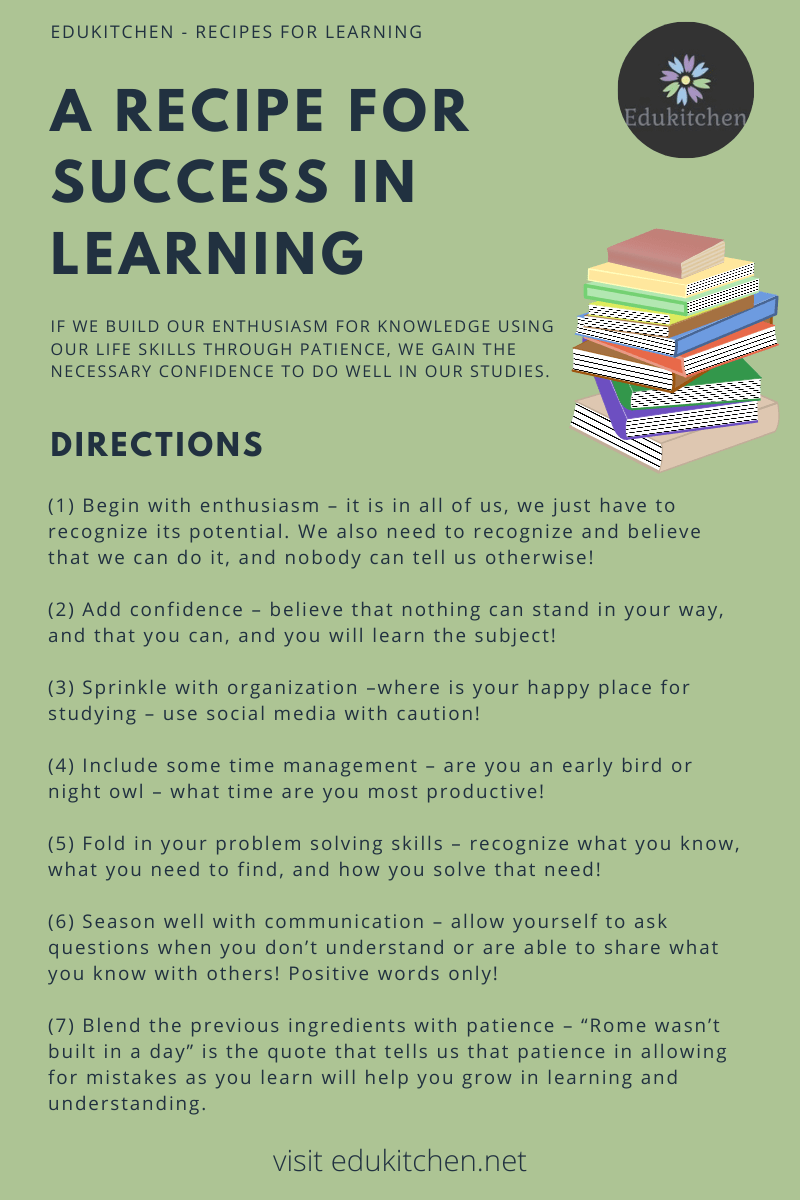
Related Topics
Explore more of website by visiting the links below.
- 5 Classroom Management Strategies for Homeschooling
- How to Use Formative Assessments in the Homeschool Classroom
- 7 Tips for Homeschool Lesson Planning
- Six Summer Time Activities At Home Kids Will Love
- 5 Ways to Improve Physical Health in Kids At Home
- Effective Discipline Strategies for the Homeschool Classroom
Final Thoughts…
Behavior and discipline strategies are really just ways teachers and students can form relationships that will be healthy and supportive during their time together.
With changes to society coming rapidly it can become overwhelming on the mental health of both teachers and students.

Let us remember that social media life is not real life and that we are all individuals with important things to offer each other in this life.
If we seek to find the best in others and not let others who seek to find fault in us win, then perhaps we can share in behaviors that are meant to keep problems away.
For more on the benefits to mental health through physical health in education, click here.
Share Your Thoughts!
EduKitchen would like to hear from you! Let know your thoughts in the comments below on discipline strategies in the classroom. We would love for you to connect with us on social media!



